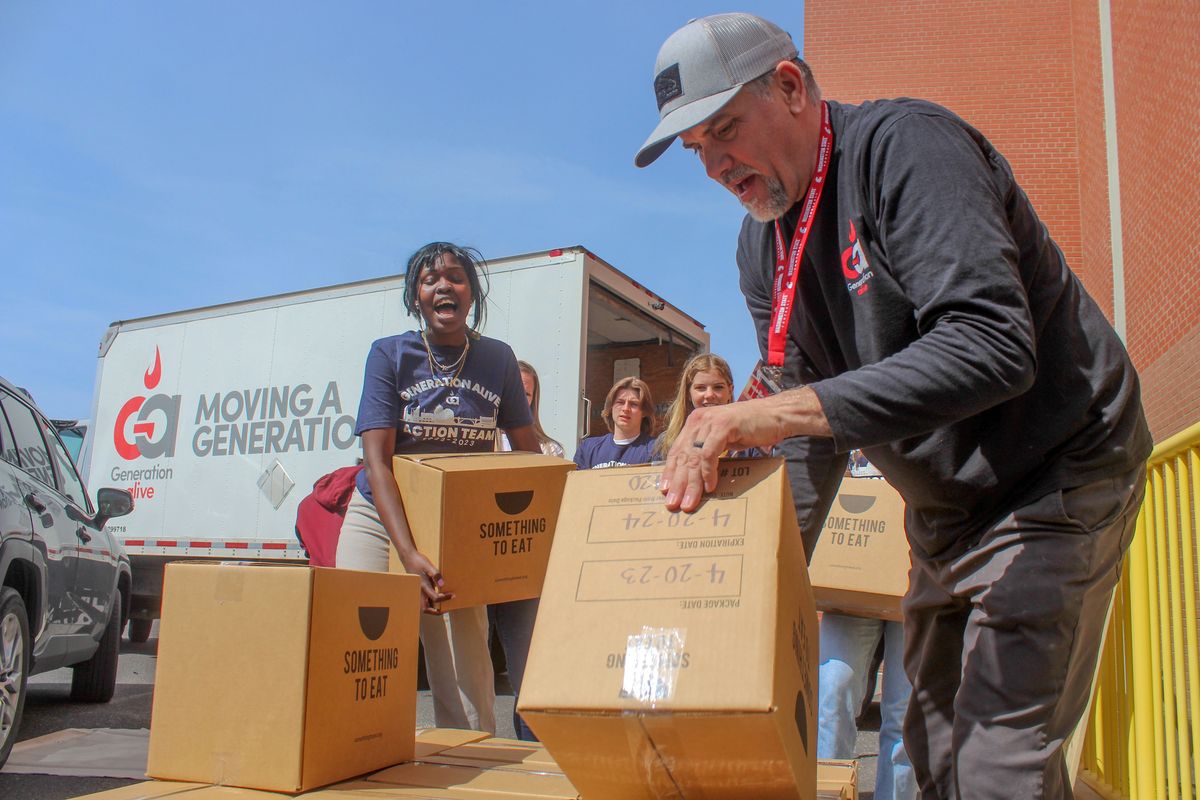Nonprofit teaches local students to ‘unite against a prevailing problem’: hunger

A local nonprofit dedicated to food security is teaching students about much more than meals.
“We talk about the name of the organization, Generation Alive, all the time because we believe that helping others and living beyond yourself is real life,” said Chris Sloan, the organization’s community engagement director. “We’re about activating young people to serve, and we do this to build a life-long commitment to seeing needs in the community and doing so through a lens of compassion.”
The nonprofit originally was founded in 2006 by Major League Baseball pitcher Jeremy Affeldt, who spent a portion of his youth in Spokane, when he found deeper meaning in connecting with his community and empowering youth. What once began as a single program reaching 200 kids has grown to more than 40 programs reaching over 15,000 kids annually.
CEO JJ Vancil said the nonprofit aims to teach kids “ empathy and compassion, building leadership skills, enhancing academic learning, promoting community engagement and strengthening social connections.”
And to lead the youth toward those goals are people like Sloan, who helps secure businesses or churches to sponsor the program at local schools. That includes at Shadle Park High School, where Sloan recently guided charity efforts.
There’s a process to Generation Alive’s work at local schools dubbed the “Action Team Program.”
First, those at Generation Alive work with school staff to establish a team of around 15 to 20 students looking to give, make an extra commitment and lead with empathy.
“I think all of us Action Team members joined because we feel a sense of duty to take a role in this because we can get our whole student body involved and feel that even a small act of kindness can have a big effect on somebody’s life,” said Shadle Park senior Nazanin Walizada.
Second, the team will begin meeting on a weekly (or more) basis for roughly two months as they plan out a school-wide assembly to introduce Generation Alive and the purpose to fellow students.
These launch-assemblies vary; usually elementary schools focus on simpler ideas, such as what it means to be compassionate, while older audiences dive deeper into food insecurity and its prominence within the community. Generation Alive staff, such as Sloan, tend to help lead the events, although that’s not always the case.
“In the case of Shadle, which was really unique, all Action Team students led the entire assembly,” Sloan said.
“The assembly planning process was everyone throwing out their best ideas without fear of judgment,” said Shadle Park junior Lydia Shepherd. “ I loved watching my fellow peers be interested in what the group and I are so passionate about, and it was even nicer to see all of the donations that were made after the presentation.”
Donations just from students leaving the assembly reached about $500.
“It made me feel beyond happy to see people walking by and bringing in donations varying from a few pennies to a couple hundred dollars,” said Shadle Park junior Nicole Martin. “We know that no matter how much money was donated, they had the intention of taking a step to help the community around them.”
“It really showed me that there are people in this generation that care for others, even if it was just a penny, they showed that they still cared,” added Shadle Park senior Joseph Barber.
All of the profits raised from the fundraiser go directly to the next step, a food packing event. The usual few-thousand dollars goes towards purchasing ingredients (such as for apple cinnamon oatmeal), materials and the equipment needed for the day-long service project where just 25 cents equates to one meal packed. The Action Team and volunteers facilitate the event, but the school’s other students also get to be involved via an assembly line packing system. All of the food prepared throughout the day goes straight to the community, usually via the Second Harvest Food Bank. At Shadle Park’s April 27th event, over 25,000 meals were prepared.
“Seeing everybody come together as a group all working together for the same cause was something I hadn’t really seen before today,” said Shadle Park junior Charlotte Hite.
“It was really cool to see everybody working together and collaborating for such a good purpose,” added Shadle Park senior Sara Carmona.
The final step is the “Compassion Challenge,” where the Action Team students are asked to give outside of school, from volunteering at another local non-profit to simply picking up litter. As Sloan puts it, “doing anything the community needs to make it a better place.”
Sloan may lead the program and guide the Action Team students, but seeing them take the reins and find confidence in the project, along with fully indulging themselves in giving and compassion, is where he finds the most gratification.
Shadle’s Action Team students believe they took quite a bit from the experience , from life skills such as public speaking and organization to seeing their hard work become success, the rewarding feeling of selflessness and making generosity a lifestyle.
“I loved seeing others come together and unite against a prevailing problem in society,” said Shadle Park senior Kyleigh Archer.
The students also made connections they won’t soon forget, as the group was made up of a mix of freshmen to seniors, a range of grades that generally don’t closely interact .
“I’ve become friends with students I wouldn’t have imagined being friends with, and it’s all because of wanting to take a stand in building a better life for the people around us,” Martin said. “I think it’s honestly one of the most beautiful things I’ve been a part of.”